过去式划线部分提
- 格式:ppt
- 大小:22.00 KB
- 文档页数:5
![一般疑问句,否定句以及对划线部分提问的答题方法[1]](https://uimg.taocdn.com/4ead43cd9b89680203d8255b.webp)
一般疑问句,否定句以及对划线部分提问的答题方法改为一般疑问句:1.先找am, is, are, was, were或can, would,放在最前面2.如果没有am, is, are, was, were或can, would,则看动词:(1)动词是过去式,句前加Did,动词变原形,其余照抄;(2)动词是第三人称单数,句前加Does,动词变原形,其余照抄。
(3)动词是原形,则句前加Do,其余照抄。
改为否定句:1.方法和上面一样,先找am, is, are, was, were或can, would,再后加not,其余照抄;2.如果没有am, is, are, was, were或can, would,则看动词:(1)动词为过去式,人后加didn’t,动词变原形,其余照抄;(2)动词为第三人称单数,人后加does n’t, 动词改为原形,其余照抄。
(3)动词为原形,则人后加don’t,其余照抄对划线部分提问:1.用适当的疑问词代替划线部分2.将剩余部分改为一般疑问句(注:如划线部分为主语,则用who代替,其余照抄;如划线部分为动词或动词短语,则用do代替,句前加what,再改为一般疑问句。
)学习小贴士:1.在be动词(is, am, are, was, were)或情态动词(can, may, must, should, would, could)后面加not,可以缩写成n’t. (情态动词后面动词用原形)如:I am a student. → I am not a student. (am not不能缩写)They are on the desk. → They are not on the desk.(are not = aren’t)2.在动词前加don’t, doesn’t, didn’t如:I have a pen.→ I don’t have a pen.She likes watching TV.→ She doesn’t like watch TV.(doesn’t后面用动词原形)We went to the park yesterday.→ We didn’t go to school yesterday. (didn’t 后面用动词原形) 3.祈使句的否定形式在句首在Don’t如: Open the door.→ Don’t open the door. (注意Don’t后面的单词开头字母不要大写)注:在改否定句时,如果句子中有some要改成any如:There are some birds in the tree.→ There aren’t any birds in the tree改一般问句和否定句要注意:☆ some 要变成 any如: There are some toys on the bed.→Are there any toys on the bed?☆第一人称(我)要与第二人称(你)互换如: I am at school now.→ Are you at school now? ( I 要变成you,所以be动词改成are)My father likes reading magazines.→ Does your father like reading magazines?对划线部分提问要注意:根据划线内容找出相对应的疑问词how和wh-词(what, when, where等),后面如有be动词或情态动词就跟be动词或情态动词,没有be动词或情态动词,后加do/does/did,划线部分的内容在问句中不出现。
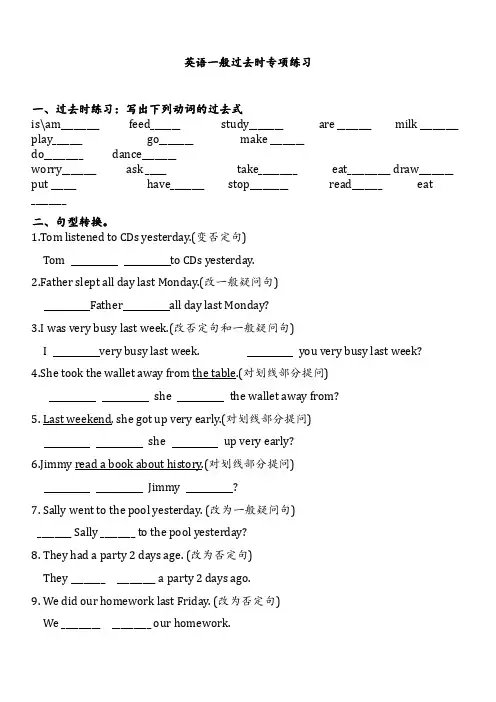
英语一般过去时专项练习一、过去时练习:写出下列动词的过去式is\am_________feed_______study________are ________milk _________ play_______go________make ________do_________dance________worry________ask _____take_________eat__________ draw________ put ______have________ stop_________read_______eat________二、句型转换。
1.Tom listened to CDs yesterday.(变否定句)Tom to CDs yesterday.2.Father slept all day last Monday.(改一般疑问句)Father all day last Monday?3.I was very busy last week.(改否定句和一般疑问句)I very busy last week. you very busy last week?4.She took the wallet away from the table.(对划线部分提问)she the wallet away from?5. Last weekend, she got up very early.(对划线部分提问)she up very early?6.Jimmy read a book about history.(对划线部分提问)Jimmy ?7. Sally went to the pool yesterday. (改为一般疑问句)________ Sally ________ to the pool yesterday?8. They had a party 2 days age. (改为否定句)They ________ _________ a party 2 days ago.9. We did our homework last Friday. (改为否定句)We _________ _________ our homework.10. Her weekend was very interesting. (划线提问)_________ _________ your weekend?11. I played soccer on my computer last weekend. (划线提问)What _______ you ________ on your computer last weekend?12. Did he study English well? (改为肯定句)He _________ English well.13. It was time for lunch. (同义句)It was time _________ ________ lunch.14. He can’t see anything on the blackboard. (同义句)He can __________ __________ on the blackboard.15、He did some cleaning this morning.(对划线部分提问)he the morning?16、My weekend was very good.( 对划线部分提问)weekend?17、We went to the mountains last weekend. ( 对划线部分提问)the mountains ?18、He did his homework last night.(改为否定句)He hes homework last night.19、John went to the zoo last Saturday. (对划线部分提问)John last Saturday?20、Tom played football this afternoon. (改为否定句)Tom football this afternoon.21、Barry visited his uncle last Sunday.(改为一般疑问句)Barry his uncle last Sunday?22、They went to the beach a week ago. (对划线部分提问)did they a week ago?三、用所给动词的适当形式填空。
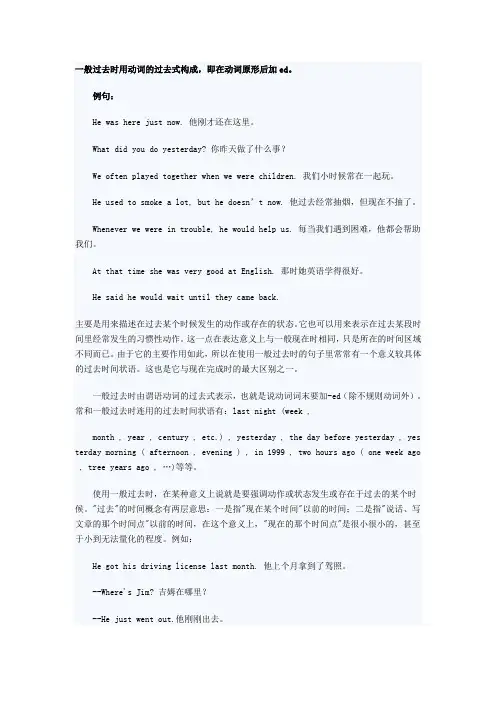
一般过去时用动词的过去式构成,即在动词原形后加ed。
例句:He was here just now. 他刚才还在这里。
What did you do yesterday? 你昨天做了什么事?We often played together when we were children. 我们小时候常在一起玩。
He used to smoke a lot, but he doesn’t now. 他过去经常抽烟,但现在不抽了。
Whenever we were in trouble, he would help us. 每当我们遇到困难,他都会帮助我们。
At that time she was very good at English. 那时她英语学得很好。
He said he would wait until they came back.主要是用来描述在过去某个时候发生的动作或存在的状态。
它也可以用来表示在过去某段时间里经常发生的习惯性动作。
这一点在表达意义上与一般现在时相同,只是所在的时间区域不同而已。
由于它的主要作用如此,所以在使用一般过去时的句子里常常有一个意义较具体的过去时间状语。
这也是它与现在完成时的最大区别之一。
一般过去时由谓语动词的过去式表示,也就是说动词词末要加-ed(除不规则动词外)。
常和一般过去时连用的过去时间状语有:last night (week ,month , year , century , etc.) , yesterday , the day before yesterday , yes terday morning ( afternoon , evening ) , in 1999 , two hours ago ( one week ago , tree years ago , …)等等。
使用一般过去时,在某种意义上说就是要强调动作或状态发生或存在于过去的某个时候。
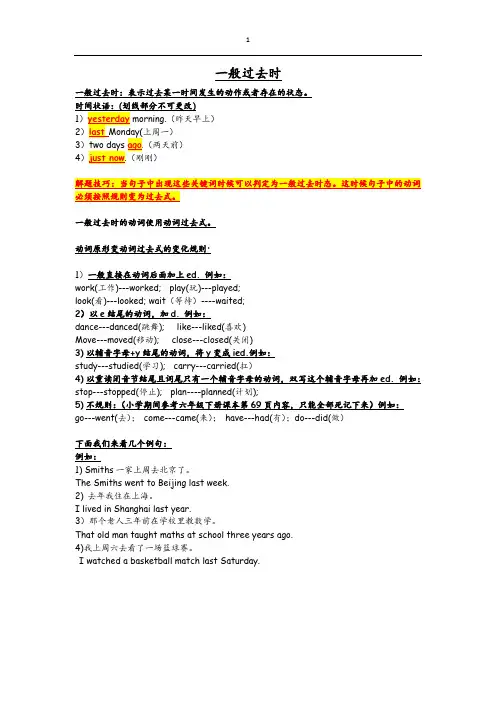
一般过去时一般过去时:表示过去某一时间发生的动作或者存在的状态。
一般过去时的动词使用动词过去式。
动词原形变动词过去式的变化规则:1)一般直接在动词后面加上ed. 例如:work(工作)---worked; play(玩)---played;look(看)---looked; wait(等待)----waited;2)以e结尾的动词,加d. 例如:dance---danced(跳舞); like---liked(喜欢)Move---moved(移动); close---closed(关闭)3)以辅音字母+y结尾的动词,将y变成ied.例如:study---studied(学习); carry---carried(扛)4)以重读闭音节结尾且词尾只有一个辅音字母的动词,双写这个辅音字母再加ed. 例如:stop---stopped(停止); plan----planned(计划);5)不规则:(小学期间参考六年级下册课本第69页内容,只能全部死记下来)例如:go---went(去);come---came(来);have---had(有);do---did(做)下面我们来看几个例句:例如:1) Smiths一家上周去北京了。
The Smiths went to Beijing last week.2) 去年我住在上海。
I lived in Shanghai last year.3)那个老人三年前在学校里教数学。
That old man taught maths at school three years ago.4)我上周六去看了一场篮球赛。
I watched a basketball match last Saturday.练习题:一、写出下列动词的过去式:make--- watch--- read--- fly--- talk--- fix--- study--- do--- have--- play--- eat---- drink--- work--- snow--- walk--- talk--- dance--- like---- carry--- draw--- wash--- know--- run--- come--- ride--- sit--- shop--- cut--- get--- go--- write--- swim--- put----二、请翻译下列句子:1)你上周末做了什么?我周六的时候打扫我的房间。
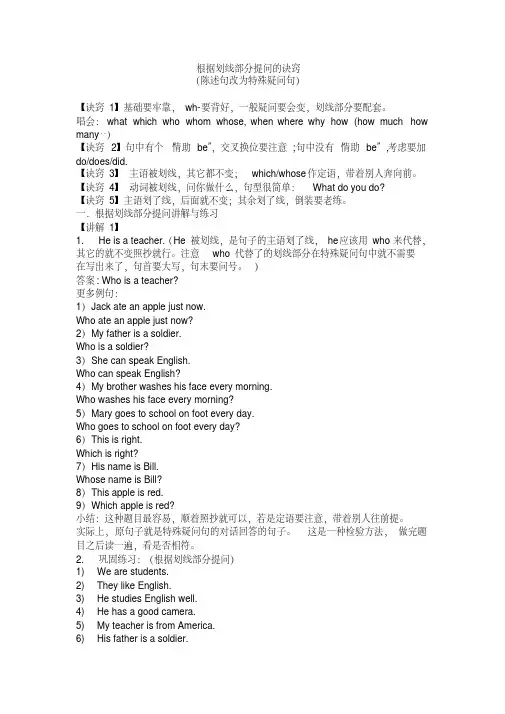
根据划线部分提问的诀窍(陈述句改为特殊疑问句)【诀窍1】基础要牢靠,wh-要背好,一般疑问要会变,划线部分要配套。
唱会:what which who whom whose, when where why how (how much how many…)【诀窍2】句中有个“情助be”,交叉换位要注意;句中没有“情助be”, 考虑要加do/does/did.【诀窍3】主语被划线,其它都不变;which/whose作定语,带着别人奔向前。
【诀窍4】动词被划线,问你做什么,句型很简单:What do you do?【诀窍5】主语划了线,后面就不变;其余划了线,倒装要老练。
一.根据划线部分提问讲解与练习【讲解1】1. He is a teacher. (He 被划线,是句子的主语划了线,he应该用who来代替,其它的就不变照抄就行。
注意who代替了的划线部分在特殊疑问句中就不需要在写出来了,句首要大写,句末要问号。
)答案: Who is a teacher?更多例句:1)Jack ate an apple just now.Who ate an apple just now?2)My father is a soldier.Who is a soldier?3)She can speak English.Who can speak English?4)My brother washes his face every morning.Who washes his face every morning?5)Mary goes to school on foot every day.Who goes to school on foot every day?6)This is right.Which is right?7)His name is Bill.Whose name is Bill?8)This apple is red.9)Which apple is red?小结:这种题目最容易,顺着照抄就可以,若是定语要注意,带着别人往前提。
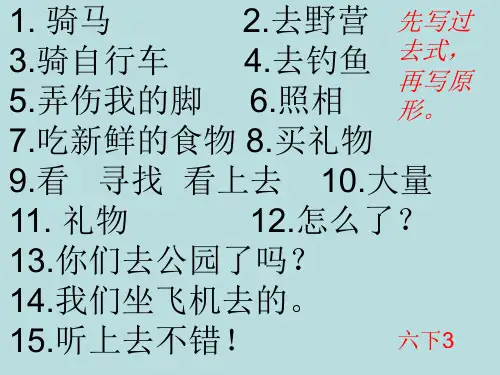
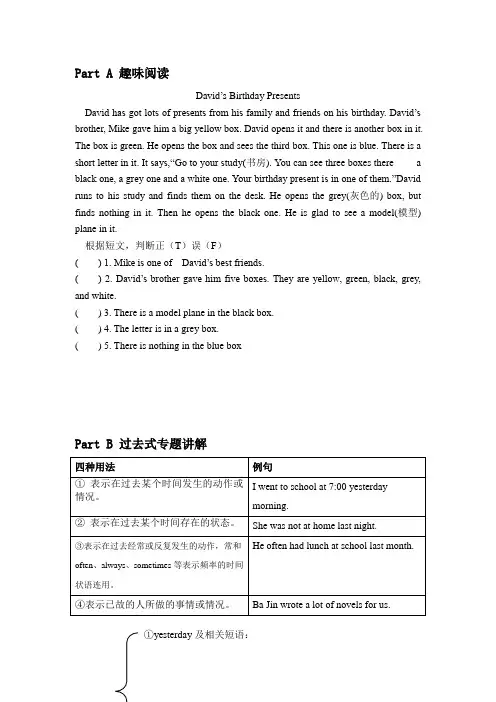
Part A 趣味阅读David’s Birthday PresentsDavid has got lots of presents from his family and friends on his birthday. David’s brother, Mike gave him a big yellow box. David opens it and there is another box in it. The box is green. He opens the box and sees the third box. This one is blue. There is a short letter in it. It says,“Go to your study(书房). You can see three boxes there____ a black one, a grey one and a white one. Your birthday present is in one of them.”David runs to his study and finds them on the desk. He opens the grey(灰色的) box, but finds nothing in it. Then he opens the black one. He is glad to see a model(模型) plane in it.根据短文,判断正(T)误(F)( ) 1. Mike is one of David’s best friends.( ) 2. David’s brother gave him five boxes. They are yellow, green, black, grey, and white.( ) 3. There is a model plane in the black box.( ) 4. The letter is in a grey box.( ) 5. There is nothing in the blue boxPart B 过去式专题讲解①yesterday及相关短语:②“last+ 时间状语”构成的短语:时间状语4种③“一段时间+ago”组成的短语:④“介词+ 时间名词”组成的短语:动词的过去式was、She was ateacher five years ago.例句+动Jenny bought a skirt yesterday.主语Jenny didn’t buy a skirt yesterday.句式Part C 过去式专题演练一、找出画线部分读音不同的单词( ) 1. A. tea B. meat C. weather D. beach( ) 2. A. back B. fast C. have D. map( ) 3. A. warm B. garden C. market D. party( ) 4. A. school B. tooth C. choose D. good( ) 5. A. book B. moody C. look D. cook二、写出下列单词的过去式watch________ wash _________ clean ________ cook play _______ visit ______ do ______ studygo ______ read _______ am/is_____ swim have______ fly______ are return三、英汉互译1、上周末6、wash clothes2、去游泳_ _ 7、visit grandparents3、去钓鱼8、listen to music4、去郊游9、play football5、看电视10、go to the park四、根据句意和已给出的首字母,补全单词1、He w to a park yesterday.2、I c my room last weekend.3、Did you r the magazine?4、Did Lucy c a mountain5、Last Saturday ,Candy v her uncle.6. What did you d_____ last weekend ?7. She r______ a book last night .8. He went s________ yesterday .9. Amy l_________ to music last Tuesday .10. We w________ fishing yesterday .11. Last Sunday ,I climbed m with father.五、用所给词的适当形式填空1.That is not___kite.That kite is very small,but____is very big. (I)2.The dress is____.Give it to ____. (she)3.Is this____watch?(you)No,it's not____. (I)4.___is my brother.___name is Jack.Look!Those stamps are____. (he)5.Here are many dolls,which one is ___ (she)六、选择题()1、-Did you help me clean my room ? -Yes , I .A、didB、doC、does( )2 -What did Lisa do yesterday? -She to music .A、listensB、listenC、listened( )3、-What did you do last weekend? -I TV.A、sawB、looked atC、watched( )4、He into the lake and to it.A、jumped,swimedB、jump, swamC、jumped,swam ( )5、Did John football yesterday?A、playB、playedC、plaied ( )6、They books last weekend .A、readB、readedC、look( )7、Did you play football Zhang Peng?A、withB、andC、to( )8、Tom busy yeaterday.A、didB、wasC、were( )9、Lisa usually her homework after super.A、doesB、doC、did( )10、Did you swimming last weekend?A、goB、goesC、went( ) 11. What ____ he _____ yesterday ?A. does, doB. do , didC. did, do( ) 12. _____ he _____ football last weekend ?A. Did, playedB. Did, playC. Did, plays( ) 13. She _______ yesterday.A. went fishB.went fishingC. goes fishing( ) 14. He _________ the clothes yesterday.A.didn’t washedB. didn’t washC. don’t washed( ) 15. They _______ English last night.A.study B. studyed C. studied ( ) 16. It ______ a windy day yesterday . A.is B. was C.am()17.What___Wu yifan do Last weekend. A.do B.did C.does()18.I ___to a park yesterday. A.went B.go C.goes()19.I___my room last weekend. A.clean B.cleans C.cleaned()20.Lisa usually___her homework after super. A.does B.do C.did()21.Did you____swimming last weekend? A.go B.went C.do七、按要求完成句子1、I played football last Thursday. (对划线部分提问)2、They played sports just now..(改为一般疑问句)3、Linda helped her anut clean the room. (对划线部分提问)4、My brother goes to school by bike.(对划线部分提问)5、Mike went shopping with his mother yesterday. (改为一般疑问句)八、读下列短文,选择正确答案Today was hot. I wentto the farm with my parents. There was a river near the farm.I went to the river with my dog. We ran and played. Suddenly I dropped into the river, “Help, help...” My dog jumped into the river and swm to me, ten minutes later, I was saved. I was grateful to him. We are good friends.( )1、It was very _________.A、coldB、hotC、windy( )2、I went to the farm with my_________.A、parentsB、friendsC、teacher( )3、I ran and played with_________.A、my catB、my dogC、my sister( )4、_________jumped into the river and saved me.A、My dogB、My motherC、My father( )5、I was very grateful to my_________.A、motherB、friendC、dog九、读短文,判断对T,错FYesterday I had morning tea with my friend Tom in a restaurant . He is fat . He likes to eat very much. We had a happy time . The waiter brought us a lot of things. After a big meal , we had bananas and apples . He drank milk and coffee. I said ,“I think we have go now ,Tom. We have been here for 3 hours.”But he said ,“No,Mike.We shouldn’t leave now . It’s lunch time.”( ) 1. Tom and Mike had tea in the bookshop.( ) 2. They had fruits after meal.( ) 3. The meal they had in the morning was lunch .( ) 4. Tom wanted to have lunch because he was hungry.( ) 5. Tom and mike are friends.。
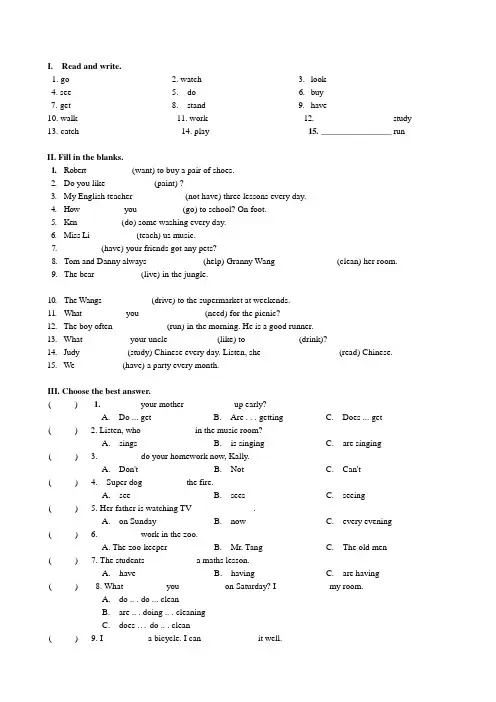
I. Read and write.1. go _________________2. watch ________________3. look ______________4. see ________________5. do _________________6. buy _______________7. get ________________ 8. stand _______________ 9. have ______________ 10. walk _______________ 11. work ______________ 12. _________________ study 13. catch _______________ 14. play ______________ 15. ________________ runII. Fill in the blanks.1.Robert __________ (want) to buy a pair of shoes.2.Do you like ___________ (paint) ?3.My English teacher ___________ (not have) three lessons every day.4.How__________ you _________ (go) to school? On foot.5.Ken _________ (do) some washing every day.6.Miss Li __________ (teach) us music.7. _________ (have) your friends got any pets?8.Tom and Danny always ____________ (help) Granny Wang _____________ (clean) her room.9.The bear __________ (live) in the jungle.10.The Wangs __________ (drive) to the supermarket at weekends.11.What _________ you ______________ (need) for the picnic?12.The boy often ___________ (run) in the morning. He is a good runner.13.What __________ your uncle __________ (like) to ___________ (drink)?14.Judy _________ (study) Chinese every day. Listen, she _________________ (read) Chinese.15.We __________ (have) a party every month.III. Choose the best answer.( ) 1. _______your mother ___________ up early?A. Do ... getB. Are . . . gettingC. Does ... get ( ) 2. Listen, who ___________ in the music room?A. singsB. is singingC. are singing( ) 3. _______ d o your homework now, Kally.A. Don'tB. NotC. Can't( ) 4. Super dog _________ the fire.A. seeB. seesC. seeing( ) 5. Her father is watching TV ____________ _.A. on SundayB. nowC. every evening ( ) 6. _______ w ork in the zoo.A. The zoo-keeperB. Mr. TangC. The old men ( ) 7. The students ___________ a maths lesson.A. haveB. havingC. are having( ) 8. What_________ you __________ o n Saturday? I ___________ my room.A. do .. . do ... cleanB. are .. . doing .. . cleaningC. does ... do .. . clean( ) 9. I _________ a bicycle. I can ____________ it well.A. am . . . rideB. have . . . rideC. have . . . riding( ) 10. The sun ____________ in the evening.A. risesB. highC. goes downIV. Rewrite the following sentences.否定句 _________________________________________________________________________一般疑问句 ______________________________________________________________________肯定回答、否定回答对划线部分提问9.The elephants eat 50 kilos of hay. (对划线部分提问)10.10. John walks to school. (另写一句意思相同的句子)V. Read and fill in the blanks.My mother is b 1 from Monday to Friday. Every morning she gets u 2 at six and cooks breakfast for us. At seven, she does some washing and cleaning. She goes towork at eight thirty. Her office is not far from our house. She often takes a b 3 to work. She finishes her work at 4 in the afternoon. She cooks dinner for us. After dinner, she w 4 TV and then goes to bed at 9:30. She doesn't work at weekends. This is my mother's t 5 .1. b _________2. u _________3. b _________4. w _________5. t _________VI. Read and answerOld John has a monkey. They are good friends. He likes the monkey very much because it is very kind (友好). In summer, Old John likes sleeping in the chair in the garden. Then the monkey sits beside Old John. He drives (驱,赶) the flies away from the old man's face.A fly is coming. Look, it's on the old man's nose. The monkey is driving it away. But the fly comes back and sits on the man's nose again. The monkey drives it away. This goes on for five or six times.Look, that fly comes again and sits on the old man's nose. The monkey is very angry. He hits (击打) the fly hard with his hand and kills (杀死) it.1.Who has a monkey?2.Why does Old John like his monkey?3.Where does the old man sleep in summer?4.Does the monkey drive the fly away?5.How does the monkey feel?VI. Write something about "My Day" in at least 5 sentences.Part 2Ⅰ. Read and write.(写出下列动词的过去式)1. eat2. catch3. are4. go ___________5. jump _____________6. put ___________7. fly ___________ 8. has ____________ 9. is ____________10. buy ___________ 11. write _____________ 12. listen____________13. do ___________ 14. say _____________ 15. show16. come __________ 17. drink _____________ 18. make ___________19. give ___________ 20. stop _____________ 21. drive ____________Keys: 1. ate 2. caught 3. were 4. went 5. jumped 6. put7. flew 8. had 9. was 10.bought 11. wrote 12. listened13. did 14. said 15. showed 16. came 17. drank 18. made19. gave 20. stopped 21. droveⅡFill in the blanks with "am, is, are, was, were". (用am, is, are, was, were 填空)1.There _________ a bird in the cage. Where __________ it now?2.It _________ a n egg. Now it __________ a chick.3.I _________ at the supermarket. Now I __________ at home.4. _________ h er teachers in the office now? No, they ___________ i n the playground justnow. But now they __________ in the library.5.Miss White __________ in America. But now she ________ in China.6.My brother__________ a student in 1997. Now he works in a hospital.7.Today __________ the second of June. Yesterday __________ t he first of June.It _________ C hildren's Day. All the students __________ very happy.8. Where _________ Miss Fang? She's reading books in the library.Keys: 1. was, is 2. was, is 3. was, am 4. Are, were, are5. was, is6. was7. is, was, was, were8. isⅢ. Read and write. (用动词的适当形式填空)1. ________ you __________ (watch) TV last night? Yes, I _________ (do).2. That man __________ (live) in Shanghai three months ago. Now he __________ (live) in Hangzhou.3.Ben _________ (not get) up at 6:30 this morning.4.The workers___________ (build) the bridge last year.5.Yesterday I __________ (play) basketball with my friends.6. ________ they _________ (go) to Nanjing by train last month? No, they ___________ (do).7.We _________ (not have) supper at home last Monday.8.Where _________ your sister __________ (go) last night?9.The nice pictures ___________ (be) on the wall yesterday.10.John _________ (not be) in the toy shop last week.11. A long time ago, Aunt Wang ________ (fly) to America.12.Our teacher _________ (like) to play the drum two years ago.Keys: 1. Did, watch, did 2. lived, lives 3. didn't get 4. built 5. played 6. Did, go, didn't7. didn't have 8. did, go 9. were 10. wasn't 11. flew 12. likedIV. Rewrite the following sentences.1.I was in the market yesterday afternoon.否定句特殊疑问句2.The leaves were brown in autumn.否定句一般疑问句肯定回答、否定回答特殊疑问句3. She went to school at seven o'clock.否定句一般疑问句肯定回答、否定回答特殊疑问句4.The children did their homework after school. (对划线部分提问)5.There were some shelves in the room. (对划线部分提问)6.The men built a big block near the school six years ago. (对划线部分提问)7.My grandfather reads newspapers every evening. (划线改为yesterday evening)8.he, yesterday, home, did, late, come (连词成句)9. Tony didn't go for a picnic last Saturday. (划线改为every Sunday)10. Did Mary's classmates sing in the music room? (肯定句)Keys:1. I wasn't in the market yesterday afternoon.Where were you yesterday afternoon?2. The leaves weren't brown in autumn.Were the leaves brown in autumn? Yes, they were. No, they weren't. What colour were the leaves in autumn?3. She didn't go to school at seven o'clock.Did she go to school at seven o'clock? Yes, she did. No, she didn't. When did she go to school?4. What did the children do after school?5. What was in the room?6. Where did the men build a big block six years ago?7. My grandfather read newspapers yesterday evening.8. Did he come home late yesterday?9. Tony doesn't go for a picnic every Saturday.10. Mary's classmates sang in the music room.V. Do like this. (仿例造句)Model 1: I am a teacher. —► I was a teacher.1.Are you in the classroom? —►2.There is a photo on the wall. —►3.Mr. Bob goes to Hangzhou by bus. —►4.Do you like music? —►5.The girl has some lovely dolls. —►Keys:1. Were you in the classroom?2. There was a photo on the wall.3. Mr. Bob went to Hangzhou by bus.4. Did you like music?5. The girl had some lovely dolls.VI. Answer the questions. (根据实际情况回答问题)1.Where were you this morning?2.What day was yesterday?3.What was your mother in 2004?4.What did your father do last night?5.Did you go to the shop just now?6.Were you in the bookstore last weekend?Keys: (Omitted)Ⅶ. Reading comprehension.(A)One day, a dog had a piece of meat for his dinner. He went home happily with the meat in his mouth. On his way home, there was a river. He looked at it. What did he see? He saw a dog! And the dog had some meat in his mouth, too. "If I get it, I'll have two pieces of meat \" He opened his mouth to get it. But just then, his own (自己的)meat fell into the river. He went home sadly.Read and judge. ( 阅读短文,判断正误,用T或F 表示)( ) 1. One day a dog had two pieces of meat.( ) 2. There was a dog in the water, too.( ) 3. The dog in the water had two pieces of meat.( ) 4. The dog's meat fell into the river.( ) 5. The dog wasn't happy at last (最后).Keys: 1. F 2. F 3. F 4. T 5. T(B)Yesterday was Sunday. Sam and Peter went to a zoo. On the road they saw a small dog. They played with the dog for some time. Then they went to the zoo. First, they went to see the monkeys. The monkeys were very happy to see them because Sam and Peter had some bananas in their hands. Sam asked a monkey to jump, and it jumped. He asked the monkey to sit down and it sat on the floor. So he gave the monkey a banana. The monkey took it quickly and ran away. Then Sam and Peter went to see the elephants, the giraffes, the tigers and the squirrels. They went home happily at 6:00 p. m.Read and answer.1.Where did Sam and Peter go yesterday?2.What did they see on the road?3.Were the monkeys happy to see them?4.Were there any dogs in the zoo?5.When did they go home?Keys: 1. They went to a zoo. 2. They saw a dog. 3. Yes, they were.4. No, there weren't.5. They went home at 6:00 p. m.Ⅷ. Write at least five sentences on the topic "Last Sunday". (以"Last Sunday"为题,写一篇不少于5句话的短文,语句通顺,内容连贯)。
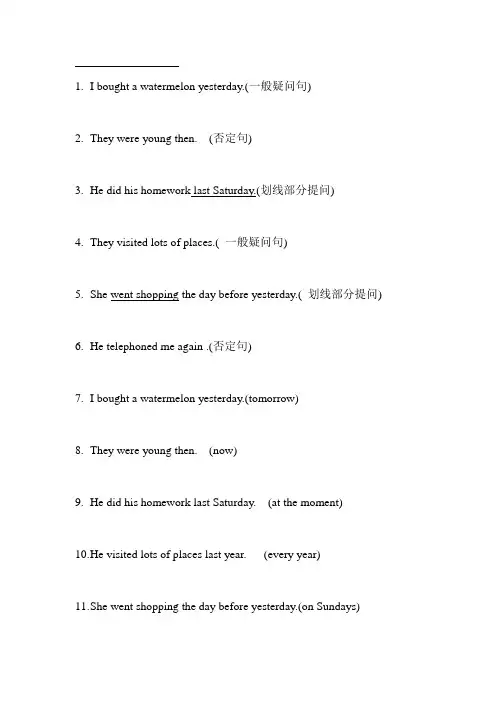
1.I bought a watermelon yesterday.(一般疑问句)2.They were young then. (否定句)3.He did his homework last Saturday.(划线部分提问)4.They visited lots of places.( 一般疑问句)5.She went shopping the day before yesterday.( 划线部分提问)6.He telephoned me again .(否定句)7.I bought a watermelon yesterday.(tomorrow)8.They were young then. (now)9.He did his homework last Saturday. (at the moment)10.H e visited lots of places last year. (every year)11.S he went shopping the day before yesterday.(on Sundays)13.The dog is eating a bone .(every day)14.She washes the dishes every day.(改为一般疑问句)15.Mary does the housework.(改为一般否定句)16.He comes from China. (对划线部分提问)17.I don’t go to work by car.(用He 做主语)18.He usually watches TV at night.(用now, listen to the radio改为现在进行时)19.They are typing the letters. (对划线部分提问)20.He can read the letter. .(改为一般疑问句)21. I can lift this table. (改为一般否定句)22.Turn on the radio.(用He做主语改为一般将来时)。
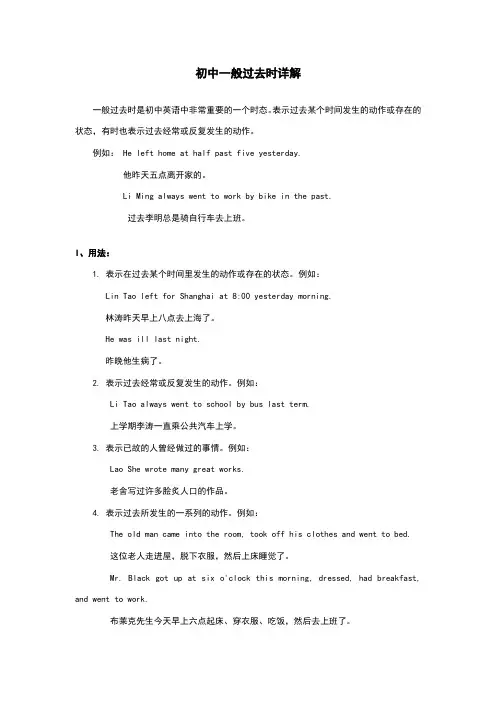
初中一般过去时详解一般过去时是初中英语中非常重要的一个时态。
表示过去某个时间发生的动作或存在的状态,有时也表示过去经常或反复发生的动作。
例如: He left home at half past five yesterday.他昨天五点离开家的。
Li Ming always went to work by bike in the past.过去李明总是骑自行车去上班。
I、用法:1. 表示在过去某个时间里发生的动作或存在的状态。
例如:Lin Tao left for Shanghai at 8:00 yesterday morning.林涛昨天早上八点去上海了。
He was ill last night.昨晚他生病了。
2. 表示过去经常或反复发生的动作。
例如:Li Tao always went to school by bus last term.上学期李涛一直乘公共汽车上学。
3. 表示已故的人曾经做过的事情。
例如:Lao She wrote many great works.老舍写过许多脍炙人口的作品。
4. 表示过去所发生的一系列的动作。
例如:The old man came into the room, took off his clothes and went to bed.这位老人走进屋,脱下衣服,然后上床睡觉了。
Mr. Black got up at six o'clock this morning, dressed, had breakfast, and went to work.布莱克先生今天早上六点起床、穿衣服、吃饭,然后去上班了。
II、一般过去时如何识别?每个时态,都会有其独特的标志性词语(主要是时间状语)。
可以称其为“标志词”。
通常来讲,一般过去时常见的标志词有:1. yesterday, the day before yesterday.2. last week / year / month / term…(简称last系列)3. two hours ago, three years ago, a moment ago…(简称ago系列)4. in / on + 过去的年/月/日,如 in 1999, in April, 20055. just now, once upon a time, one day…III、分类:1. 含有be动词的一般过去时:系动词be的过去式有两种形式:was和were。
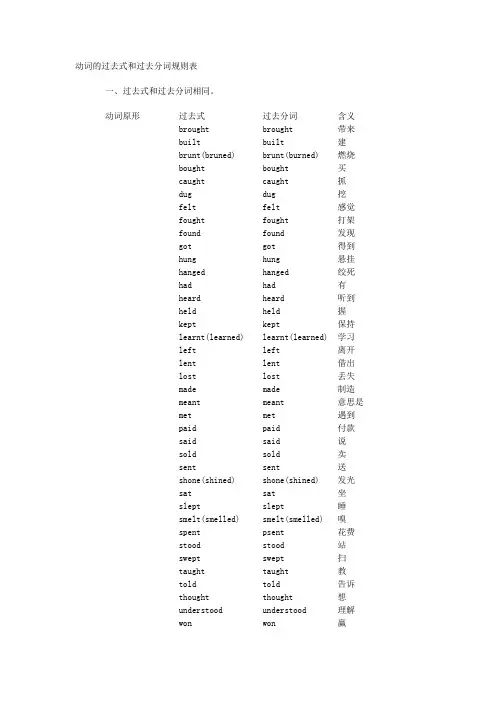
动词的过去式和过去分词规则表一、过去式和过去分词相同。
动词原形过去式过去分词含义brought brought带来built built建brunt(bruned)brunt(burned)燃烧bought bought买caught caught抓dug dug挖felt felt感觉fought fought打架found found发现got got得到hung hung悬挂hanged hanged绞死had had有heard heard听到held held握kept kept保持learnt(learned)learnt(learned)学习left left离开lent lent借出lost lost丢失made made制造meant meant意思是met met遇到paid paid付款said said说sold sold卖sent sent送shone(shined)shone(shined)发光sat sat坐slept slept睡smelt(smelled)smelt(smelled)嗅spent psent花费stood stood站swept swept扫taught taught教told told告诉thought thought想understood understood理解won won赢二、动词的过去分词是在动词原形后加n或者en.动词原形过去式过去分词含义beat beaten打blew blown吹drew drawn拉drove driven驾驶ate eaten吃fell fallen下落gave given给grew grown生长knew known知道mistook mistaken弄错rode ridden乘、骑rose risen升saw seen看见showed shown出示,表现took taken拿走threw thrown抛、掷wrote written写三、原形、过去式和过去分词相同。
一般过去时的概念:一般过去时表示过去某个时间发生的动作或存在的状态。
常和表示过去的时间状语连用,如:last year, yesterday等。
例如:I saw him in the street yesterday. 昨天我在街上看见他了。
一般过去时的结构1、肯定形式:主语+动词过去式+其他例句:She often came to help us in those days.2、否定形式:①was/were+not;②在行为动词前加didn't,同时还原行为动词例句:I didn't know you like coffee.3、一般疑问句:①Did+主语+谓语动词原型+其他?②WasWere+主语+表语?例如:-Did you go to Beijing last week?-Yes, we did. (No, we didn't.)4、一般过去时的特殊疑问句的构成:疑问词+did+主语+动词原形+其它?例如:-What did you do last night?-I did my homework.动词过去式的构成:(1)规则动词过去式的构成有四条规则:①一般在动词原形末尾直接加上-ed。
如:look-looked。
②以不发音的字母e结尾的动词,去e再加-ed。
如:live-lived。
③末尾只有一个辅音字母的重读闭音节(辅元辅结构),先双写这个辅音字母,再加-ed。
如:stop-stopped。
④末尾是辅音字母+y结尾的动词,先变y为i,然后再加-ed。
如:study-studied。
(2)不规则动词的过去式需特殊记忆。
如:am(is)-was, are-were, go-went, come-came, take-took, have (has)-had等。
一般过去时口诀一般过去时并不难,表示过去动作、状态记心间。
动词要用过去式,时间状语句末站。
否定句很简单,didn't 站在动词原形前,其它部分不要变。
初中一般过去时详解一般过去时是初中英语中非常重要的一个时态。
表示过去某个时间发生的动作或存在的状态,有时也表示过去经常或反复发生的动作。
例如:He left home at half past five yesterday.他昨天五点离开家的。
Li Ming always went to work by bike in the past.过去李明总是骑自行车去上班。
I、用法:1. 表示在过去某个时间里发生的动作或存在的状态。
例如:Lin Tao left for Shanghai at 8:00 yesterday morning.林涛昨天早上八点去上海了。
He was ill last night.昨晚他生病了。
2. 表示过去经常或反复发生的动作。
例如:Li Tao always went to school by bus last term.上学期李涛一直乘公共汽车上学。
3. 表示已故的人曾经做过的事情。
例如:Lao She wrote many great works.老舍写过许多脍炙人口的作品。
4. 表示过去所发生的一系列的动作。
例如:The old man came into the room, took off his clothes and went to bed.这位老人走进屋,脱下衣服,然后上床睡觉了。
Mr. Black got up at six o'clock this morning, dressed, had breakfast, and went to work.布莱克先生今天早上六点起床、穿衣服、吃饭,然后去上班了。
II、一般过去时如何识别?每个时态,都会有其独特的标志性词语(主要是时间状语)。
可以称其为“标志词”。
通常来讲,一般过去时常见的标志词有:1. yesterday, the day before yesterday.2. last week / year / month / term…(简称last系列)3. two hours ago, three years ago, a moment ago…(简称ago系列)4. in / on + 过去的年/月/日,如in 1999, in April, 20055. just now, once upon a time, one day…III、分类:1. 含有be动词的一般过去时:系动词be的过去式有两种形式:was和were。
不规则动词的过去式(请大家背熟记牢)sit —— sat throw —— threw am, is —— wasdrink —— drank draw —— drew are —— weresing —— sang fly ——flew do —— didbegin —— began grow —— grew have, has —— hadswim —— swam put —— put may —— mightgive —— gave cut —— cut can —— couldring —— rang let —— let shall ——shouldrun —— ran read —— read will —— wouldride —— rode catch —— caught go —— wentwrite —— wrote teach —— taught eat —— atedrive —— drove think —— thought hear —— heardkeep —— kept buy —— bought see —— sawsleep —— slept fight —— fought find —— foundsweep —— swept hold —— held wear —— worefeel —— felt tell —— told meet —— metcome —— came get —— got mean —— meantbecome —— became make —— made speak —— spoketake —— took say —— said1)is, am -was are-were2) begin-began ring-rang drink-drank swim-swam give-gave sing-sang sit-sat run-ran have-had make-madecome-came eat-ate3) write-wrote ride-rode speak-spoke drive-drove stand-stoodtell-told win-won get-got take-took4) sleep-slept sweep-swept feel-felt keep-kept spell-spelt spend-spent bend-bentmeet-met go-went5) know-knew fly-flew blow-blew grow-grew throw-threw draw-drew (glow-glowed)6) teach-taught catch-caught buy-boughtfight-fought think-thought7) find-found hear-heard say-said lie-laysee-saw learn-learnt mean-meant8) put-put read-read cut-cut let-let一、熟读本课单词、会听写、默写。
过去式的规律动词过去式变化规律关键词:规则动词的过去式由“动词原形+-ed"构成,具体变化有:1. 直接在词尾加—ed.如:want—wanted, work—worked,need—needed, clean—cleaned2. 以不发音的e结尾的在词尾加—d。
如:like—liked,live—lived, use-used,move—moved3. 以一个元音字母加一个辅音字母结尾的重读闭音节动词,先双写结尾的辅音字母,再加-ed。
如:stop—stopped, trip-tripped4。
以辅音字母加y结尾的动词,先把y变成i,再加—ed。
如:study—studied, carry-carried,hurry—hurried, marry-married不规则动词的过去式见课本后的不规则动词表。
大体上归纳有以下六条记忆法:1. 以t结尾的词,过去式与原形相同。
如:put—put,let—let,cut-cut,beat—beat2。
以d结尾的词,把d变成t。
如:build-built, lend—lent, send—sent, spend-spent3。
以n结尾的词,在词后加t。
如:mean—meant, burn—burnt, learn-learnt4。
以ow / aw结尾的词,把ow / aw变成ew。
如:blow—blew,draw—drew, know-knew,grow-grew5. 含有双写字母的词,将双写改为单写,在词尾加t。
如:keep—kept, sleep-slept, feel-felt, smell-smelt6。
含有元音字母o / i的词,将o / i变成a。
如:sing—sang, give-gave,sit—sat,drink—drank 规则动词词尾加—ed有三种读音:1。
在清辅音后读作[t]。
如:asked,helped,watched,stopped2. 在浊辅音和元音后读作[d]。
般过去时的用法及结构1. 一般过去时的根本用法一般过去时表示过去某个时间发生的动作或存在的状态, 也可表示过去经常或反复发生的动作.常和表示过去的时间状语连用,如yesterday, last week, last night, in 2003, two days ago 等.【举例】I got up at 6:30 yesterday. 我昨天6:30起床.My father was very busy last week. 我父亲上周很忙.2. 一般过去时的根本结构⑴肯定句"主语+动词过去式+其他"或者"主语+ was/were +其他〞.【举例】I played tennis last weekend.我上周末打网球了.My school trip was great. 我的学校郊游棒极了.⑵否认句"主语+ didn' t +动词原形+其他"或"主语+ wasn' t/weren' t +其他〞.【举例】The girl didn ' t play computer games yesterday afternoon.这个女孩昨天下午没玩电子游戏.Old Henry wasn ' t happy last Friday.上星期五老亨利不快乐.⑶一般疑问句“ Did +主语+动词原形+其他〞肯定答复为“ Yes,主语+ did〞,否认答复为"No,主语+ didn' t"或者"Was/Were +主语+其他〞肯定答复为"Yes,主语+ was/were",否认答复为"No,主语+ wasn' t/weren' t".【举例】一Did you go to the beach 你们去海滩了吗—Yes, we did./No, we didn ' t.是的,我们去了./不,我们没有.-Was your weekend OK 你的周末过得还行吧一Yes, it was./ No, it wasn ' t.是的,还行./不,不行.⑷特殊疑问句:特殊疑问词+ 一般疑问句〔顺序〕【举例】一What did Li Lei do last weekend 李雷上周末干什么了-He visited his grandparents. 他去看了他的祖父母.—Where were you yesterday 你昨天在哪儿-I was at home. 我在家里.为了便于记忆行为动词〔实义动词〕的一般过去时用法及结构, 我们可用以下歌诀来帮助记忆:动词一般过去时,表示过去发生事.谓语动词过去式,过去时间作标志. 否认形式很简单,主语之后didn' t添.谓语动词要复原.疑问构成有规那么,主语前面加did.过去式的构成be动词和实义动词过去式的构成:⑴ 系动词be的过去式有两种形式:was和were.其中was是am 和is的过去式, were 是are的过去式.⑵规那么动词过去式的构成:①一般在动词末尾加一edo【举例】walk fwalked playfplayed②以不发音e结尾的动词末尾只加一d.【举例】lovefloved decide fdecided③结尾是"辅音字母+ y 〞的动词.先将y变为i,再加一ed.【举仞'll study fstudied carry fcarried④末尾只有一个辅音字母的重读闭音节,先双写该辅音字母,再加一ed.【举例】stop-stopped plan fplanned规那么动词的过去式构成方法可用以下口诀来记忆:过去式构成有规律,一般词尾加一ed如果词尾有个e 〔不发音的〕,只需直接加上一d. “辅音字母+ y 〞在词尾,变y为i加一ed.“一辅重闭〞作尾巴,双写之后加一ed.随堂练习:一.写出以下动词的过去式./is _________ ___________ _____________ ____________'t 6. aren' t二.用适当的词完成以下对话.1.— How was your weekend — It great.一What _ you_ last weekend — I _ some homework.to the beach.2. 一What last weekend She3. —What —___ they do last weekend —They ___ ___ to the movies.三.用括号内所给词的适当形式填空.1. We(enjoy) ourselves at the party last night.(study) for the English test last Sunday.you(go) to the Great Wall last year4. What day(be) it yesterdayold man(be)ill and went to see a doctor.(have) a party last night.(visit) the museum and went home.8.— How(be) the students — They were very friendly.often(have) supper at home. Today he(have) supper at school.had great fun(play) in the water.made me(feel) very happy.12.-he(have) lunch at nine — No, he didn ' t.(buy) a guitar yesterday.四.句型转换.1. He came here last month.(改为否认句)He here last month.1.1. hey played football this morning.(改为一般疑问句并作简略答复)一they football this morning —Yes, they./ No, they.3 .They went to Beijing last year.(就划线局部提问)they last year.4 .Tom watched TV last night.(改为一般疑问句)Tom TV last night5 .Mary does homework every day.(用last night 改写句子)Mary.般现在时的用法与结构1、一般现在时的定义及构成一般现在时表示现在经常反复发生的动作、存在的状态或习惯性的动作.〔1〕 be〔am,is,are〕动词:〔作谓语动词时〕肯定句:主语+be动词〔am,is,are〕+其它.如:①I am a student.〔主语+be动词+名词〕②They are hungry.〔主语+be动词+形容词〕③He is out.〔主语+be动词+副词〕④That pen is mine.〔主语+be动词+ 代词〕⑤I am fifteen.〔主语+be动词+数词〕⑥The bike is under the tree.〔主语+be动词+H司短语〕运用am,is,are写三个句子否认句:主语+ be〔am,is,are〕 + not +其它.如:He is not a worker.他不是工人. 运用am,is,are 写三个句子一般疑问句:Be〔am,is,are〕 +主语+其它.如:-Are you a student -Yes. I am. / No, I'm not.运用am,is,are 写三个句子特殊疑问句:疑问词+一般疑问句.如:Where is my bike 运用am,is,are 写三个句子特殊疑问句:疑问词〔what, where, who, when, which, whose, how, how many, how much, what shape,what colour,〕,找句子中有没有be动词〔is, am或者are〕或情态动词或者助动词〔特殊疑问句:疑问词+be动词〔is, am或者are〕或情态动词或者助动词+其他〕〔2〕行为动词:主语+ 行为动词+ 〔其它〕.〔作谓语动词时〕1〕主语不是第三人称单数时,肯定句为:主语+动词原形+其它否认式为:主语+don't+动词原形+其它疑问句为:Do+主语+动词原形+其它. ① We speak Chinese.②Do you speak Chinese ---Yes, I do. / No, I don't.③They don't speak Chinese.写三个句子2〕当主语是第三人称单数时:〔he,she,it,A/An,单独的人或事物:Lily/book〕肯定句为:主语+动词〔词尾加s或es〕 +其它.否认式为:主语+doesn't+动词原形+其它.疑问句式:Does+主语+动词原形+其它①He speaks English.②He doesn't speaks English.③-Does she go to work by bike Yes, she does. / No, she doesn't.写三个句子特殊疑问句:疑问词+一般疑问句.如:How does your father go to work3〕动词+s的变化规那么〔1〕一般情况下,直接加-s,如:cook-cooks, milk-milks〔2〕以s. x. sh. ch. o 结尾,力口-es, 如: guess-guesses, wash-washes, watch-watches, go-goes 〔3〕以"辅音字母+y"结尾,变y为i,再加-es,如:study-studies〔3〕情态动词〔作谓语动词时〕〔can,could,be able to,may,might,must,have to,need,shall,should, will,would〕时,句子结构为:肯定句:主语+情态动词+动词原形.否认句:主语+情态动词+not+动词原形一般疑问句;情态动词+主语+动词原形+其他特殊疑问句:疑问词+情态动词+主语+动词原形+其他Eg:① He can speak English.② Can I help you What can I do for you在实际应用中,一般现在时常与以下时间状语联用:always, usually, often, sometimes, every week (day, year, month …), once a week, on Sundays 例句:He usually plays football on Sundays.一、写出以下动词的第三人称单数talk forget hope stop perform play saybuy worry fly study like make take__love recite become come drive二、句型转换1. The children have a good time in the park.否认句:_______________________________________________一般疑问句:_____________________________________________对划线局部提问:_________________________________________2. There is about nine hundred people at the concert.否认句:_______________________________________________一般疑问句:_____________________________________________对划线局部提问:_________________________________________3. Ann does her homework yesterday evening.否认句:_______________________________________________一般疑问句:_____________________________________________对划线局部提问:_________________________________________4. I read an English book.否认句:______________________________________________一般疑问句:_____________________________________________肯定/否认答复:________________________________________对划线局部提问:_________________________________________5. My brother is in the park just now.否认句:______________________________________________一般疑问句:_____________________________________________对划线局部提问:_________________________________________一般现在时第三人称单数句型转换练习1. I go to school before 7:00 in the morning.(he ) __________________________________________________________2. I always go shopping with my mum on Sunday.( she ) ________________________________________________________2.1 sometimes play computer games after school on Sunday.( he ) _________________________________________________________4. I always take exercise after class on Monday.( my mother ) ________________________________________________________般过去时详细讲解与练习题一、巧记一般过去时:动词一般过去时,表示过去发生的事;be用was或用were, have,has变had;谓语动词过去式,过去时间作标志;一般动词加-ed,假设是特殊得硬记.否认句很简单,主语之后didn' t添;疑问句也不难,did放在主语前;}不含be动词时如果谓语之前有did,谓语动词需复原;动词假设是was,were,否认就把not添. }含be动词时疑问句也不难,要把was, were放在主语前.二、be的一般过去时:学习动词be的一般过去时,下面有一口诀,它可以帮你们更好地掌握动词be的一般过去时.be的过去时有四巧:一是时间状语巧,表示过去的短语要记牢;二是形式巧,单数was,复数were ;三巧是否认句结构, not紧跟was/were ;四是疑问句式巧,was/were向前跑(提前).【一巧】时间状语(即标志词)巧.一般过去时表示过去发生的动作或存在的状态,恰巧与表示过去的一些时间状语连用.1 . yesterday 或以其构成的短语:yesterday morning(afternoon, evening) 等;2 .由“last+-时间名词〞构成的短语:last night, last year (winter, month, week)等;3 .由“时间段+ago〞构成的短语: a moment ago, a short time ago, an hour ago 等;4 .其它:just now 等5 .由某些表示过去时态的从句等.【二巧】形式巧.它与一般现在时一样,形式多样:当主语是第一人称单数或第三人称单数时,谓语动词用was;主语是第二人称或其他人称复数时,谓语动词用were.例如:I was in the classroom yesterday morning . 昨天早上我在教室里.He was at school last Tuesday. 上周二他在学校.They were over there a moment ago . 刚刚他们在刃B边.【三巧】否认句结构巧.与动词be的一般现在时一样, 它在动词后面加not即可变成否认句,并且was, were与not可以缩写成wasn't, weren't o即:主语 + wasn't/ weren't + 表语 +其他.例如:I was not (= wasn't) here yesterday . 昨天我不在这儿.My parents were not ( = weren't) at home last Sunday . 上周日我父母不在家.【四巧】疑问句式巧.把was, were 提到句首,句末用问号即可变为一般疑问句. 即: Was(Were) +主语+表语+其他这恰巧与动词be 的一般现在时的疑问句式相似.例如: Were you at home the day before yesterday ? 前天你在家吗Was she late this morning?今天早上她迟到了吗更巧的是疑问句的答语也相似,肯定答复用“ Yes,主语+ was/were . 否认答复用“No,主语+ wasn't/weren't .".例如:一Were Wei Hua and Han Mei here just now ?刚刚魏华和韩梅在这儿吗— Yes, they were. (No, they weren't .)是的,她们在.(不,她们不在.)一、单项选择: 从以下各题后所给的四个选项中选择最正确答案填空. (10)( )1. My father ill yesterday . A isn't B. aren't C. wasn't D. weren't ()2. your parents at home last week ?A IsB WasC AreD Were()3. The twins in Dalian last year.They here now .A are; wereB . were; areC was; areD were; was ()4. your father at work the day yesterday (前天)? A. Was; before B. Is; beforeC. Was; afterD. Is; after()5. —Who was on duty last Friday ?A I amB I wasC Yes, I wasD No, I wasn't ()6. I cleaned my classroom.A with three hoursB three hours agoC in three hoursD three hours before ( )7. I came my house two days ago .A back onB back toC to backD back () 8 . He did some reading at home.A What does your father do yesterday eveningB What does your brother do in the schoolC What did your brother do over the weekendD Where did your brother go last Sunday ()9. What did you do I went to the movies.A next morning Bover the weekend C in the weekend D next Monday ()10. The koala sleeps, but gets up. A during the day; at the eveningB at day during nightC in the day during the eveningD during the day ; at night二、请用正确动词形式填空.(10)1. I ______2.__ (have) an exciting party last weekend. _ she _______ (practice) her guitar yesterday No, she ___________ 3. What____ T om _______ (do) on Saturday eveningHe ______ _(watch) TV and _________ (read) an interesting book. 4. They all________ (go) to the mountains yesterday morning.5.She ____ ____ (not visit) her aunt last weekend.She _____ ___ (stay) at home and _______ (do) some cleaning.6. When __ ____ you ________ (write) this song I _________ (write) it last year.7 .My friend, Carol,〔study〕 for the math test and〔practice〕 English last night.8 .Mr. Li〔do〕 the project on Monday morning Yes, he.9 . How〔be〕 Jim's weekend It〔be not〕 bad.10 .〔be〕 your mother a sales assistant last year No. she.三、译以下句子〔20〕1 .我过了一个忙碌但却刺激的周末.I ______________________________________ exciting weekend.2 . Jenny喜欢看书.昨晚她看了一本英语书.Jenny likes. She an English book last night.3 . Emma每天都看电视.可是昨天他没有看.Emma TV every day. But he yesterday.4 .上周六他们做什么了他们做作业和购物了.What they SaturdayThey homework and.5 .今天早上方方得做饭,由于他父亲不在家.This morning Fangfang ________________ because his father yesterday.6 .你还有什么要说的What would you like7 .放学另U忘了向老说声再见. Don, t forget ____________________________ the teacher.8 .为什么你昨晚没有看电视Why you TV last night9 .他在清扫教室的时候,发现地上有块表.When he the classroom, he a watch on the ground.10 .他什么时候出生的1980年.--When he---1980.四、改写句子:〔20〕1、Lucy did her homework at home.〔改否认句〕Lucy her homework at home.2、He found some meat in the fridge 〔冰箱〕.〔变一般疑问句〕 he meat in the fridge3、There was some orange in the cup.〔变一般疑问句〕 there orange in the cup4. Frank read an interesting book about history. 〔一般疑问句〕Frank an interesting book about history5. Why not go out for a walk 〔同义句〕out for a walk6. Thomas spent RMB 10 on this book.〔否认句〕Thomas RMB 10 on this book.7. My family went to the beach last week.〔划线提问〕family last week8. I think she is Lily' s sister.〔否认句.注意否认转移〕9. Sally often does some reading in the morning. 〔否认句〕Sally often some reading in the morning.10. He is a tall, thin boy.〔划线提问〕_ he五、改错题(20)1. How is Jane yesterday2. He go to school by bus last week.3. He often goes home at 6:00 last month.4. I can fly kites seven years ago. _____________________________5. Did you saw him just now. ___________________________________6. Tom wasn' t watch TV last night. _____________________________________7. I didn ' t my homework yesterday. ____________________________________8. He wait for you three hours ago. ___________________________________9. Who find it just now ________________________________________make him cry (哭)just now __________________________________六、完形填空(10)Tom did not like doing his homework , because he liked to do some 1 things after school . And his teacher always 2 a lotof mistakes in his homework .Then one day, his maths teacher 3 at Tom' s homework and saw that he got all hisanswers right . He was very 4 and surprised (惊奇).The next morning before class ,he called Tom 5 his desk and 6 to him , “You got all your homework right thistime . Did your father help you " Sometimes Tom' s father helped him with his homework , 7 this time he didn ' t help Tom because he 8 at home . So Tom answered, " NO,Sir. He Was busy last night, so I 9 to do it 1010. . A. others B. another C . the other D. other11. . A. made B. found C. looked at D. looked12. . A. laughed B. knocked C. looked D. saw13. . A. please B. pleased C. pleasure D. sad14. . A. to B. forC. inD. at15. . A. talked B. asked C. spoke D. said16. . A. and B. but C. so D. or17. . A. isn' t B. won' tbeC. wasn' t D. can' t be18. . A. wanted B . mustn ' t C. liked D. had19. 0. A. itself B . of them C . myself D. himself七.写作(10).日记一那么,字数50---60.记叙一天的活动:1 .早晨起床,吃饭,上学;2 .上午的课程,并就其中一堂课进行描述; 3.午休的活动;4.下午的课程及作业;5.晚上的安排.答案:一、单项选择:1---5 CDBAB 6----10 BBCBD二、 2. Did; practice; didn't ; do; watched; read5.didn't visit; stayed; did write; wrote ; practiced8. Did; do;did ; wasn't 10. Was; wasn't三、 a busy but books; read; didn't watch TV ; do last; did their; went shoppingto cook breakfast; wasn't at home ; to say; say goodbye to ; watch ; found ; born; In四、't do 2. Did; find any 3. Was; any4. Did; read5. Why don't you go 't spend did your; go 8. I don't think she is Lily's sister 't; do. 10. What does; look like五、't didn't7.在didn't 后力口do六、1----5 DBCBA 6——10 DBCDC七、写作〔略〕。
六年级上册英语划线部分提问及语法总复习六年级上册英语划线部分提问及语法总复姓名:一、小学英语划线部分提问的归纳就划线部分提问,做题有方法:划线部分在问句出现肯定错,特殊疑问词要根据提问的意思来选择。
以下口诀要牢记:1.问“谁”用who;2.问“谁的”,用whose;3.问“地点哪里”,用where;4.问“原因”,用why;5.问“身体状况”,用how;6.问“方式”,用how;7.问“年龄”,用how old;8.问“多少”,可数用how many;不可数用how much;9.问"价钱”用how much;10.问“哪一个”,用which;11.问“什么”,用what;12.问“职业”,用what;13.问“颜色”,用what colour;14.问“星期”,用what day;15.问什么学科,用what subject;16.问“什么时候”,用when;17.问几点用What’s the time?或What time is it?非凡疑问句=“非凡疑问词+普通疑问句”划线局部是“事或物”,非凡疑问词用whatEg: This is a bag. ---What is this?We often play XXX . ---What do you often do on Sundays ?2划线部分是“人”,特殊疑问词用whois my sister. ---Who is she ?划线局部是“地点”,非凡疑问词用whereapple is on the desk.---Where is the apple ?划线局部是“时间”,非凡疑问词用what time或when. ---What time is it ?I usually get up at six forty . --- When do you usually get up?划线部分是“年龄”,特殊疑问词用how oldEg:I am twelve . ---How old are you?XXX- two . ---How old is your mother ?划线部分是“职业”,特殊疑问词用whatis a worker. ---What is Tom?/What does Tom do?划线局部是“色彩”,非凡疑问词用what colourblue . ---What colour is your hat?划线局部是“数目”,非凡疑问词用how many或how muchEg:I can see five birds in the tree.---How many birds can you see ?There is some tea in the cup. ---How much tea is there in the cup ?划线局部是“几何钱”,非凡疑问词用how muchbook is ten yuan . ---How much is this book ?划线部分是“形容词性物主代词或名词性物主代词”,特殊疑问词用XXX . ---XXX ?XXX is yours. ---Whose is the pen ?小学英语对划线部分提问答题口诀:一代(用疑问词替代划线局部),二移(把疑问词移至句首),三找(找is , are ,can,would抄在疑问词后,没有则用do,does(用于主语是第三人称),呈现I am则间接改为Are you),四抄(照抄其它部分)1五改(出现some,要考虑是否改为any。